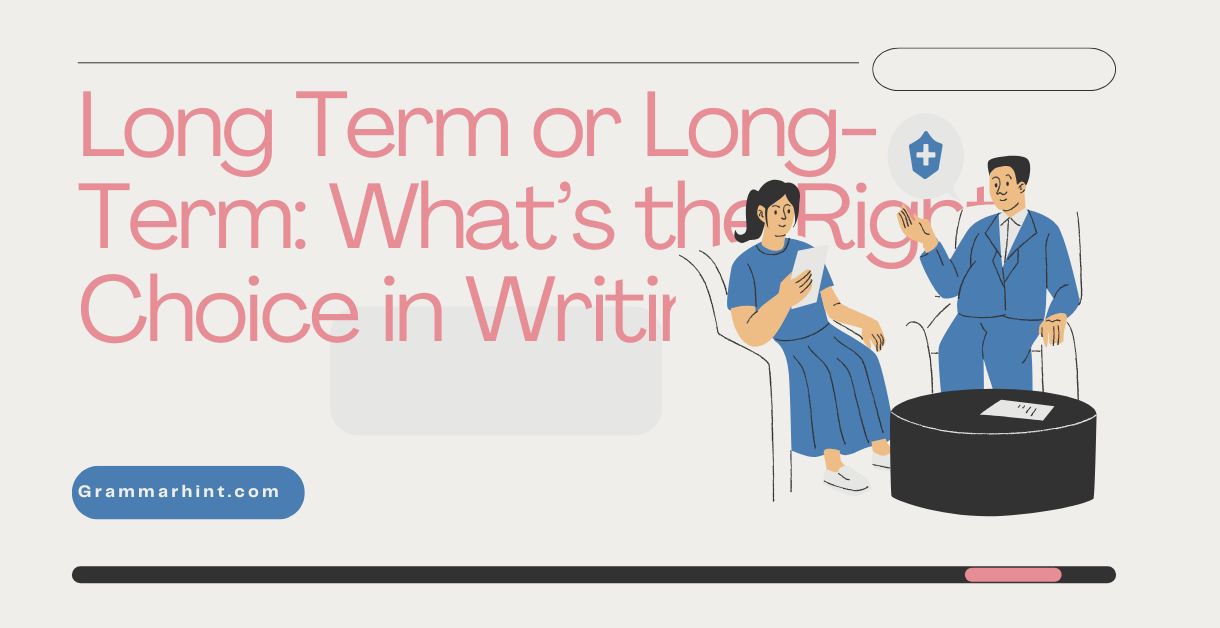Language is full of subtle choices that shape how our writing sounds and feels. One such choice that trips up even seasoned writers is whether to write “long term or long-term.”
It seems simple on the surface, but grammar gets tricky when hyphens enter the scene. In this guide, we’ll break down the long-term vs long term debate, give you real-world examples (like emails), and explore how to use this term correctly depending on the usage context.
What Does “Long-Term” Mean?
Before we get into grammar rules, let’s clarify the long-term definition. When someone refers to something as long-term, they mean it spans an extended period, often with the sense of commitment, duration, or permanence.
Synonyms for “Long-Term”
- Extended
- Prolonged
- Enduring
- Sustained
- Lasting
- Chronic
- Ongoing
- Long haul
- Distant future
- Lengthy duration
- Long-range
These words help express the extended period meaning in various tones and contexts.
The Core Question: Long Term or Long-Term?
So, which one is correct?
- Use “long-term” (hyphenated) when it functions as an adjective before a noun.
- Use “long term” (no hyphen) when it functions as a noun phrase on its own.
This distinction is rooted in grammar rules for compound adjectives and hyphen use in writing. Let’s dig deeper.
Adjective Usage: When to Use “Long-Term”

When “long-term” appears before a noun to describe it, it acts as a hyphenated adjective. This is a textbook case of a compound modifier.
Example: “We need a long-term strategy to survive market fluctuations.”
The hyphen connects the words “long” and “term” to clarify that together, they modify “strategy.”
More Examples of Adjective Usage:
- “The company is focused on **long-term growth.”
- “We’re investing in **long-term solutions.”
- “Long-term planning is crucial for stability.”
These examples follow the correct use of compound adjectives, helping with writing clarity.
Sample Email (Adjective Usage):
Subject: Long-Term Planning Proposal
Hi Janet,
I’ve attached a proposal outlining our long-term marketing plan. Let me know if you’d like to discuss it this week.
Best,
Ryan
Noun Phrases: When to Use “Long Term”
When used on its own, without modifying a noun, “long term” becomes a noun phrase. It refers to the idea or concept of a prolonged period.
Example: “We’re looking at this investment for the long term.”
Here, “long term” doesn’t describe a specific noun. It stands as a noun phrase by itself.
More Examples of Noun Phrase Usage:
- “She’s committed for the long term.”
- “In the long term, prices are expected to rise.”
- “I’m here for the long term, not just a quick gain.”
Sample Email (Noun Phrase Usage):
Subject: Career Intentions
Hi Marcus,
After reviewing the role, I want to confirm that I’m interested in staying with the team for the long term.
Thanks,
Alina
Writing Tip: Hyphen Use in Writing
If you’re ever unsure about how to use long term correctly, just ask yourself:
- Is it acting as a modifier before a noun? Use the hyphen.
- Is it a standalone idea (a noun phrase)? Skip the hyphen.
This aligns with essential grammar tips for hyphenation.
Quick Test:
| Sentence | Hyphen Needed? | Correct Form |
|---|---|---|
| We’re developing a ___ vision. | Yes | long-term |
| They are in it for the ___. | No | long term |
| ___ goals often yield better outcomes. | Yes | Long-term |
| The CEO announced plans for the ___. | No | long term |
Common Mistakes and Confusions
Grammar confuses even native speakers. Let’s look at grammar confusion examples around “long term or long-term.”
- “This is a long term investment.” ❌
(Wrong. It should be long-term investment.) - “We want to grow in the long-term.” ❌
(Wrong. It should be in the long term, no hyphen.)
This confusion happens when people don’t recognize the difference between a noun phrase vs adjective phrase.
Longterm or Long-Term?
Let’s address this head-on: “longterm” is not a proper spelling in formal writing. It’s often seen in casual settings or marketing, but it doesn’t follow standard grammar & syntax rules.
Correct: long-term
Incorrect: longterm
However, the non-hyphenated single word does occasionally pop up in branding or casual usage.
Example:
- “Longterm Health Solutions” — a company name. Acceptable in branding.
Still, in professional or academic writing, always go with long-term.
Verb Usage: Can “Long-Term” Be a Verb?

Nope. “Long-term” is never used as a verb. If you’re describing an action over a long period, restructure the sentence.
Incorrect: “We long-termed our efforts.” Correct: “We sustained our efforts over the long term.”
Use actual verb phrases like:
- “sustained efforts”
- “planned for the future”
- “invested for the long haul”
Real-World Usage Contexts
Understanding usage contexts helps you avoid mistakes. Here’s how “long-term” shows up in different professional domains:
1. Finance
- “We advise long-term investments in low-volatility markets.”
- “Holding stocks for the long term increases gains.”
2. Health
- “This is a long-term treatment plan.”
- “Exercise benefits you in the long term.”
3. Education
- “Our long-term strategy focuses on skill-based learning.”
- “Education reforms will pay off in the long term.”
4. Business
- “We’re committed to long-term success.”
- “Short-term fixes won’t work in the long term.”
Long-Term Planning Examples
Need inspiration? Here are some long term planning examples from various industries:
- Tech Startups: “Develop a long-term roadmap for AI product deployment.”
- Nonprofits: “Focus on long-term impact rather than short-term visibility.”
- Marketing: “Invest in long-term brand equity over viral campaigns.”
- Human Resources: “Implement long-term talent development strategies.”
These examples show how adjective placement in English is crucial for writing tips for professionals.
Grammar Rule Summary: Long Term or Long-Term Grammar Rule
| Usage | Form | Example |
| Adjective before a noun | Hyphenated (long-term) | long-term project |
| Standalone noun phrase | Not hyphenated (long term) | for the long term |
These are the basic grammar rules for compound adjectives and their application.
Quick Comparisons with Similar Grammar Topics
Loose vs Lose: Commonly Confused Word Pair
- “Loose” = not tight
- “Lose” = to misplace or not win
Pick-Up vs Pickup: Compound Word Usage
- “Pick-up” = action (noun)
- “Pickup” = truck or act of collecting
Rouse vs Arouse: Subtle Verb Differences
- “Rouse” = to wake up or stir
- “Arouse” = to evoke a feeling (emotion or excitement)
Vicious vs Viscous: Spelling and Meaning Confusions
- “Vicious” = cruel
- “Viscous” = thick and sticky
Understanding these helps refine your language learning and writing style.
Conclusion: Choose with Confidence
When it comes to long term or long-term, it all depends on context:
- As an adjective, use the hyphen: “long-term goal”
- As a noun phrase, drop the hyphen: “for the long term”
Avoid the common mistake of using longterm unless you’re naming a brand. These distinctions sharpen your writing and boost clarity, especially in professional settings.
Keep these rules in mind, and you’ll never second-guess your hyphenated adjectives again.









